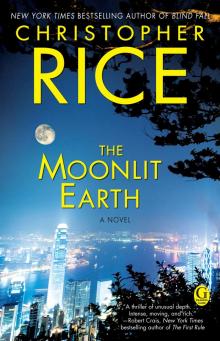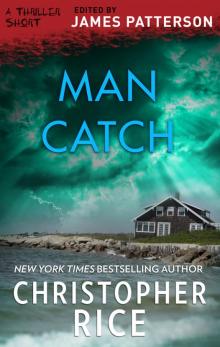- Home
- Christopher Rice
The Moonlit Earth Page 5
The Moonlit Earth Read online
Page 5
But what am I? That was the real question. Her economics professor at Berkeley had a cute saying she would use only with students she got to know well outside of the classroom: An ego is something you can rely on only when you’re doing well. And if there was one thing Megan was sure of, it was that she was most certainly not doing well. She was definitely being taken care of. But well was a term she reserved for people who were able to enjoy the rewards of having met obstacles with fortitude. In a moment of crisis, she had lacked the courage to speak truth to power and it had pretty much destroyed her budding career.
“Is everything all right?” It was Hannah’s unfamiliar voice. Megan turned and found the tiny woman standing in the doorway to the larger room. When she saw the expression on Megan’s face, Hannah said, “Nothing. He’s outside and he looked upset and I just wasn’t sure if—”
She checked the face of her iPhone for the time. “Christ, it’s been almost twenty minutes, hasn’t it? Where is he?”
“On the street. He was on the phone when I came back in.”
Outside, she found Lucas standing on the sidewalk, staring at the passing traffic with such intensity she thought for a moment that there had been an accident somewhere up the block. But when he sensed her approaching, he turned, bouncing his BlackBerry against his thigh with his right hand as if he had just terminated a call.
“Are you all right?” she asked him. “Hannah said—”
“So what do you think?” he asked. His voice was so loud, so out of sync with her own, that she almost took a step backward. He forced a broad smile.
“I’m sorry I left you out here so long. Hannah said you looked upset and I …”
He batted his left hand at an invisible fly and made a sputtering sound with his lips. Clearly, the phone call had pissed him off and he was trying not to show it.
“OK,” she began again. “So, first let me start by saying that I barely know what to say. You’ve been generous with me in the past but this is … I don’t know what this is, Lucas. Part of me wants to cry and another part of me wants to jump up and down for joy and another part of me thinks the only job I deserve is fry cook at Denny’s.”
“Out of the question,” he interjected. “Not on my watch!”
“Well, thank you. That’s … Anyway, so I hate to ask you this but I’m wondering if we can make this work in a different way. What I’m trying to say is that environmental impact isn’t really my area. Since I graduated I’ve only worked with human-impact issues and I know the environment can impact us all but …”
“Right. You’re a people person.”
“That’s one way of putting it. But … OK, the thing we always had to deal with at the Siegel Foundation was that about ninety percent of the people we served were dealing with serious drug addiction and profound mental-health issues. Now, the conventional wisdom a few years ago was that the mental illness came first and because the person couldn’t afford proper care they would end up self-medicating with street drugs.
“But there’ve been some studies that say the opposite might be the case, that the addiction to drugs actually creates or in some cases mimics the symptoms of profound mental illness. … Look, I don’t want to bore you with all this and it isn’t the best pitch in the world, but I would like to start there if you’ll let me. Maybe look into building an organization that focuses on addiction issues among the homeless and treats those issues as they should be treated, which is like a public health issue. Does that make sense?”
“Sure,” he said, nodding. “That sounds great, Megan.”
That must have been one hell of a phone call, she thought. Lucas was an educated, sophisticated conservative, and if he hadn’t been so distracted, he would have been able to read between the lines of what she had just said. She wanted to start a nonprofit that encouraged the federal government to stop treating addiction as a criminal matter, and start treating it as a public health issue even among those who couldn’t afford expensive rehabs. It was a liberal cause célèbre, but it might not play so well on Adams Street.
But Lucas just smiled and extended his hand to her and said, “We’ve got a deal!”
“Are you sure?”
“Of course I am,” he barked.
They shook on it and his plastic smile remained firmly in place.
“Are you all right?” she asked him.
“I’ve got some things I have to take care of at the office, so I think I’m going to—”
“You drove me here.”
“Oh, shit. Right. Well, maybe we could—”
“Whatever. It’s like a ten-minute walk. Go do what you need to do. I guess I could use some time in my new office anyway.” As soon as the words were out of her mouth, she barked with laughter.
“Live it up, Megan. You deserve it.”
She wanted to tell him he had all the conviction of a greeter at Knott’s Berry Farm but that didn’t seem like an ideal way to express her gratitude. Something serious was going down at the firm and he needed to get back there. He had turned his back to her and started off down the street when she called out to him.
“Thank you,” she said.
As if her words had pulled him out of a daze, he closed the distance between them and enfolded her in his arms. Even though she didn’t want to, she thought of Cameron’s comment from the night before. In another time, he would have tried to marry you. But while there seemed to be some desperation in the way he held her in his arms, there wasn’t anything sexual about the embrace. In his right hand, he pressed his BlackBerry against her left shoulder blade with enough pressure to cause a sharp pain.
When they parted, he avoided her eyes and started off down the sidewalk again. She was watching him walk off when he stopped, turned, and said, “By the way, you should call your mother and tell her about all of this. I didn’t say anything to her in case you turned it down. But I know it will ease her mind.”
“Sure,” she answered. “Oh, and Cameron said to tell you he would be in touch.”
Lucas just stared at her for several seconds. Then he gave her a slight nod and held up his hand. Some people would call it a wave but to her it looked like he was trying to keep this small pronouncement of hers from distracting him from whatever nightmare was waiting for him back at the office. And his expression as he stepped out into the street was as blank and unreadable as the one she had seen on her brother’s face the night before, as he had stared down at Lucas from behind a frame of wrought iron.
4
Hong Kong
Several minutes after the Airport Express train left the station, the flight attendant placed a call on his mobile phone that lasted only thirty seconds but left him with a dazed and faraway expression on his face. From several rows behind him, Majed watched the man closely as he terminated the call, tucked his phone into the pocket of his gray polyester pants, and sank down into one of the available seats at the front of the car.
Because the man was tall and long-limbed and made his living flying through the air, Majed called him the Swan. The men Majed worked with parroted this nickname only because it allowed them to mock the flight attendant’s effeminate ways without angering their employer. Majed was offended by this.
His people were the Hijazi and they had once held sway over the western coast of Saudi Arabia before they were conquered by the House of Saud in the 1920s. Throughout his lifetime the Wahabi fundamentalists who helped vault the Al-Saud to power had mocked Majed’s people as lacking the manliness of true Arabs. This injustice had taught him a valuable lesson at an early age: those who pretended to prize masculinity for its own sake did so only so they could use the absence of it as a pretext for stealing one’s flock, or slaughtering one’s neighbors. While he had learned how to fight with his bare hands, he had done so only because the enemies of his people valued the skill. Let interminable poems of valor be written about other men, men who could not bring themselves to put the Koran to song.
Outside, the bone white apartment hi
gh-rises of Tung Chung flew past the windows, and were replaced by the jagged green flanks of Lantau Island descending into whitecap-strewn seas the color of slate. As was his custom, Majed rose from his seat and walked to the back of the train car. There was enough morning sunlight streaming in through the windows to justify keeping his sunglasses on, but it wasn’t as if there was a bathroom on the train he could appear to be looking for, so he kept his steps slow, as if his walk up the aisle was intended to rid him of drowsiness.
The other passengers were mostly weary business travelers who had arrived on all-night flights from urban centers all over the world, and the train’s gentle motion had rocked most of them to sleep in their comfortable high-backed seats. With a deft touch of his right hand, Majed steadied a briefcase that was about to slide off the lap of a Nordic-looking woman who dozed with an open mouth.
No one on the train appeared to be as interested in the Swan as he was. But it was journalists his employer was most concerned about and who knew what they looked like? So after scanning as many faces he could, he returned to his seat and pretended to watch the soundless advertisements on the small video screen at the front of the car.
He was trained to bring a man to his knees with a few quick, precise movements. In several seconds, he could empty the SIG Sauer holstered against the small of his back into the head of a target. Yet this had become his job; searching for unwanted familiar faces amid Hong Kong crowds.
The work would have been unbearably tedious if he had not managed to fall in love with the city. And there was an ever-present incentive. As temperamental and unreliable as he was from day to day, Majed’s employer was the kind of man who had the wealth and power to render the borders of nations irrelevant.
At Central Station, the Swan disembarked, along with most of the other passengers, and Majed followed him out onto the elevated walkway that lead to the Star Ferry Terminal.
Did the Swan know he was being followed? Certainly he had learned to expect this kind of surveillance by now. But if he was aware of Majed standing a few yards away, amid the throng of early morning commuters, clutching their Starbucks cups as they awaited the arrival of the hunter green double-decker ferry boat, he gave no indication of it.
Once they were both settled on the upper deck of the ferry, Majed allowed his attention to leave the Swan as well as the other passengers. He craned his neck to see the vista they were leaving in their wake.
As the morning sunlight gathered more strength, the layers of mist over the harbor began to thin, offering a clear view of the cluster of skyscrapers packed into the narrow band of land between the waterfront and Victoria Peak. The tallest of them was Two International Finance Centre. Locals joked that the top floors of the eighty-eight-story obelisk resembled the head of an electric razor. But his favorite of the assemblage was the Bank of China building, which looked like a squat version of the famous Sears Tower building in America and was clad with massive crossbars that would be illuminated the color of clean bone after sunset.
Yet his sense of awe over the skyline was girded by shame. What would his father have to say of such a city? His father nursed secret dreams that someday the city of Jeddah would be restored to its rightful place as the cosmopolitan center of the Middle East. For him, Majed’s decision to travel to America was a terrible betrayal of their heritage. Never mind that it was his father’s liberal teachings that had inspired Majed to make the journey west in the first place. Why had he hounded his eldest son to become fluent in English? It wasn’t as if they vacationed in Switzerland like wealthy royals from Riyadh.
When Majed offered up these details in his own defense, his father would hear none of it. The man was descended from Red Sea fishermen. In his early thirties, he and an older brother had made a successful leap into coastal shrimp farming. But it was the architecture and history of his native city that had shaped his most driving ambition—to aid in the restoration of Al-Balad, the city’s historic central district. They were precious blocks that had been neglected to the point of destruction, and in restoring them, Majed’s father hoped to make some small stride toward rescuing his kingdom from the grip of the Al-Saud and their fanatical Wahabi compatriots.
Now Majed could envision him walking the streets of Al-Balad, surrounded by old houses cut from the white coral of the Red Sea reef, railing against the monstrous arrogance of a city like Hong Kong, which filled in more and more of its own harbor every year. But it was a conversation they would never have; his father had refused to answer any of the letters Majed had sent him after being deported from America on an expired visa in the months following 9/11.
If he discovered that one of his sons was now working for a wealthy family in bed with the Al-Saud, he would die of a heart attack on the spot. How could Majed explain to his father that his employer had given him more than just an income? Would his father laugh in his face if he told him that what his new boss had given him was, quite literally, the world? Probably so. Why do you need the world when you have your own history to save?
The bench beneath him shuddered as the ferry’s engines powered down. Some of the passengers got to their feet and started moving toward the exit. Grateful to have been jolted out of his thoughts, Majed remained seated. Once the ferry docked, the Swan allowed the other passengers to exit before him.
Finally, when he and Majed were the only two passengers left on the upper deck, the Swan rose to his feet and extended the handle on his flight bag. His eyes met Majed’s briefly, and the thin suggestion of a smile played at the corners of his mouth. Then he made for the exit as if he were a stranger who had looked too long.
The phone call, Majed thought. It’s still bothering him. Perhaps it had been a particularly rough flight. The Swan appeared more fatigued than usual, though Majed knew the flight attendants could often sleep for several hours at a stretch in hidden rest areas above the main cabin.
Separated by a distance of several yards, they left the ferry terminal and emerged onto the expansive paved plaza that ran along the Tsim Sha Tsui waterfront. The Swan lacked some of his usual grace; there was a slump in his walk and his head was bowed, as if he were unsure of his steps but unwilling to slow his pace.
When he passed through the entrance to the Nordham Hotel, he didn’t offer his usual nod to the uniformed doorman, and he didn’t slow enough to keep the wheels of his flight bag from making a cracking sound against the door frame. The lower half of the hotel’s façade was taken up by a three-story curtain of glass that reflected the passing traffic and prevented Majed from keeping sight of Cameron as he entered the expansive lobby. Was he too distracted to remember the next little step in their arrival ritual?
Twenty minutes later, Majed felt the vibration of his satellite phone in his hip holster.
“Two-oh-one-six,” the Swan said.
“Thank you. Is there anything you need?”
“Do you have any weed?” Majed wasn’t sure how to respond. “I was kidding. Jesus.”
“We leave at ten thirty. Please let me know if you plan on leaving the hotel.”
“You don’t think I know the routine by now?”
Humor and irritation in the same exchange. How to respond? The perks of his new job were too many to count but there were moments when he wished the family he worked for had given him some sort of rule book.
“I’m sorry,” the Swan said. “It was a really long flight.”
“Yes. I know.”
“Do you?”
I know you placed a phone call that did not make you happy, but it is not appropriate for me to say that. “It is a long way, yes?”
“Yes, Majed. It’s a very long way. I’m going to try to get some sleep. Thank you.”
Majed was relieved when the Swan hung up on him. A few seconds later, Majed dialed the number for the closest thing he had to a supervisor. Ali answered after the second ring. Even though the man spoke passable English, he insisted that Majed use Arabic whenever they spoke privately.
“The Sw
an has landed,” Majed said. “That is very humorous. Are there any other jokes for me this morning?”
“Yes. I am to remain within five blocks of his hotel until late into the night. I believe there is a part of you that is very amused by this.”
“You believe this order came from me?”
“Perhaps the Prince suggested ten blocks and you reduced it to five. For the sake of being humorous.” No laughter came from the other end of the line. Ali could be a taskmaster, but he was being particularly grim this morning. While their boss was not technically a prince, his father sat at the right hand of one, which had made him fabulously rich.
“You do not love Hong Kong? Is it not as grand as the Western cities you used to reside in?”
“Grand places? Such as Wilton Manors, Florida?”
“Do not be coy with me. You have a certain skip in your walk before you depart. The other night, I thought I heard you whistling.”
“It is Faud who whistles. I only sing to myself in the shower.”
“You have a problem with Faud?”
“I have no problems. I am a man without problems, Ali.” Majed fell silent so the unspoken question could hang between them: What is your problem this morning, Ali?
“Why do you call him the Swan?” Ali asked.
“Because he is graceful. And he flies.”
“He is also very pretty, yes?”
The accusation was there, sharp enough to open an old wound. After all, Ali was from Riyadh, from the harsh land of those who believed Majed and his people were mindless singing eunuchs who blindly worshipped trees and stars while earning the hatred of the one true Allah. Before he could stop himself, Majed said, “Yes, he is as pretty as the Prince. I imagine they enjoy being pretty together.”
It was the closest Majed had ever come to articulating the secret they all shared. And the result was a long silence from the other end.

 Blood Victory: A Burning Girl Thriller (The Burning Girl)
Blood Victory: A Burning Girl Thriller (The Burning Girl) The Surrender Gate: A Desire Exchange Novel
The Surrender Gate: A Desire Exchange Novel Blind Fall
Blind Fall Dance of Desire (1001 Dark Nights)
Dance of Desire (1001 Dark Nights) Kiss The Flame: A Desire Exchange Novella (1001 Dark Nights)
Kiss The Flame: A Desire Exchange Novella (1001 Dark Nights) The Moonlit Earth
The Moonlit Earth Light Before Day
Light Before Day Man Catch
Man Catch Bone Music
Bone Music Kiss The Flame_A Desire Exchange Novella
Kiss The Flame_A Desire Exchange Novella The Heavens Rise
The Heavens Rise The Vines
The Vines Desire & Ice: A MacKenzie Family Novella (The MacKenzie Family)
Desire & Ice: A MacKenzie Family Novella (The MacKenzie Family) The Flame: A Desire Exchange Novella (1001 Dark Nights)
The Flame: A Desire Exchange Novella (1001 Dark Nights) The Snow Garden
The Snow Garden